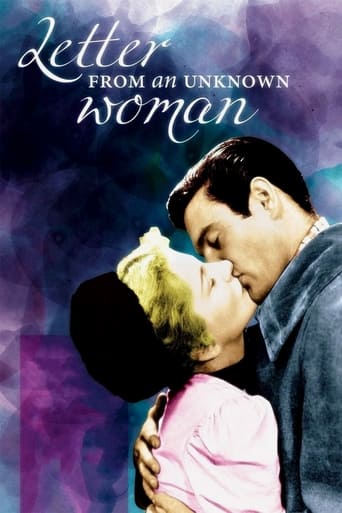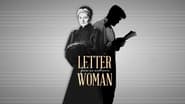John Brooks
This is one of those somewhat atmospheric romances that are based on just enough actual story and a fine enough depiction of the human mind that it just might interest the male viewer, in spite of the obviously feminine traits at work in this genre. Joan Fontaine, as good as ever in this role, symbolizes through her character the softer, more dependent aspect of the female entity. She's very sweet, cute, extremely discreet, almost ...'invisible' (*wink*wink*). Jourdain plays his role just about right as well, and it is very clearly established the relation between these two lead characters, and in their own right individually the side of the male and female avatars symbolized.All in all this is a film that holds up nicely for about the whole film; while it never really involves the viewer in a terribly emotional state, and there is a bit that is to be desired in the intensity as this film fairly flatly delivers the scenes from the original book. And if any part of the film stands for that criticism, it would be the very ending, something of a flat shortcoming, that leaves the viewer a little bit hungry for more, for something else; for a more expressive depiction of the ultimate moment of narrative.
MisterWhiplash
Sometimes you watch a film dealing with the story of a romance and the filmmaker will be content enough to reside in the realm of melodrama, of heightened emotions serving a tale of doomed romance - or maybe it won't turn 'doomed' per-say, but the stakes are always so monumental, incredible and just downright heightened that some in the audience may need handkerchiefs for their un-dry eyes and noses. For Max Ophuls, going past melodrama was a key thing. The ingredients in Letter from an Unknown Woman certainly make up melodrama, and as I watched the film I thought it would just comfortably rest there. But it was in the last reel - and especially in the minutes after the end, where I could let my mind catch up with what I was feeling - that this is closer to grand opera, and it's by nature of how determined, how passionate and versatile Ophuls camera is. He is such an active participant, but by making us the audience as well, that it raises the stakes even higher. This is a fabulous but painfully sad movie.It concerns the (mostly) unrequited romance between Lisa (Fontaine) and Stefan (Jourdan), the latter being a concert pianist who comes to take a room with her family when she's younger. She sees him play, and see him with his swagger and confidence, and is smitten right away. Does she know really that much about him? Who cares? The piano seems to express how soulful, how achingly beautiful he is - but more than that how he is not quite happy with how far he's gotten (when he stumbles playing at one point, it seems like maybe he breaks something in disgust with himself - and later she comments on this to him, that he hasn't found what he's looking for). But she leaves with her family and she never gets to tell him who she is or how she feels. Until...But no, the letter that Stefan is reading from is not at this point, which he comes across in his room as he is plotting to run away from a duel with a man who is after him for such and such a reason (and suffice to say you'll figure it out after a while, perhaps). They do meet some time later, when she returns to Vienna and they share one of those perfect romantic evenings that people may have in real life as well as in the movies. Unlike earlier in the story when she's shy and reserved, here she does open up a little more (though in this first real date she won't say she was there during the time they shared living quarters), and he is about the most charming guy on the planet in that moment. It's the kind of date where, I suppose this was a thing in the early 20th century, they go for a buggy ride... with the backdrop being changed by operators.It's interesting to note that at first I didn't really notice that the backdrop was fake until the buggy first stopped. And for a split moment I wondered, 'hey, come on, can it be that cheap a production to... oh, wait, no, it's supposed to be fake.' Thinking about it more, this is kind of like a good metaphor for their relationship - it has the veneer of gorgeous scope and splendor, but when you look closer it's not real. Jourdan has to go away after their very brief whirlwind romance, and she is left with a baby. She gets married, and the story goes ahead to years later, when the child is older and Lisa is now married to a well-off man.Again, you can see many parts of this story I've just described have the air of melodrama: a woman pining for a man she may (or may not) be able to have, and that her passions take on another light when seen through the framing - the framing is the essential thing, what sets it up as being all about the 'hindsight-is-always-20/20' aspect - that you don't know what you got until it's gone. And of course Fontaine and Jourdan are so terrific in their roles, with the former beaming with young love in the early scenes (I almost didn't recognize her in the slightly 'lower-class' get-up), and on through the middle section with her and Stefan's date, and Jourdan is... well, kind of a matinée idol, almost too good looking, if that makes sense, like deceptively the perfect guy.A lot of the brilliance of the film comes down to its economy of storytelling - it's a brisk 83 minutes, though it doesn't feel too short while watching it - and that Ophuls is not one to ever keep things static. Even that buggy scene where they share a magical moment of connection in conversation and perhaps more, because of that backdrop we're not feeling as if this is something stagey or stolid. And yet I don't feel like the technique is there just to please Ophuls demands for a crane shot here or there or most places; the high style is there for the high emotions, that this is a woman expressing how she felt through much of her adult life, and the fact that this guy seemed to be caring for her but on a totally superficial level, and never for very long.Letter from an Unknown Woman is a tragedy of taking things for granted, of believing love at a certain level will be reciprocated, and the fluidity of style matches the fluidity of intense emotions that, when broken, become all the more gut-wrenching.
Ed Uyeshima
This is quite a masochistic wallow, and yet this forgotten 1948 romantic melodrama is an intensely engrossing piece of cinema well worth seeing for acclaimed German filmmaker Max Ophuls' stylistic direction. He was known for his lyrical camera movements, the use of long tracking shots, and his atmospheric evocation of romantic melancholy – all of which are on full display here. It is no surprise that the film's star Joan Fontaine ("Rebecca") identified this as the favorite of her films since she gets to age convincingly from a gangly adolescent to a sophisticated woman of the world over the course of the time-spanning tale. Set around the turn of the last century mostly in Vienna, the flashback-driven story is adapted from a well-known Austrian novella by Howard Koch ("Casablanca").It swirls around the intense romantic yearning of a young girl named Lisa Berndle, who pines for Stephan Brand, the self-absorbed, frivolous concert pianist who lives next door. Their romantic relationship is the product of Lisa's infatuation as he casually forgets her time and again over two decades of missed opportunities, even though they do end up enjoying a brief affair. What ties them intractably together is the fact that he unknowingly leaves her pregnant and doesn't return to her after a concert tour. Years later she ends up marrying an intensely possessive aristocrat (is there any other kind?) named Johann and raising her son, but a twist of fate reunites Lisa with her lover at a concert hall where his downtrodden state does nothing to enhance his memory of their years-ago affair. Even though her obsession with him never abates, she leaves him but not before tragedy strikes.The movie's clever framing device is a letter from Lisa from her deathbed as he faces the prospect of a duel at dawn with her husband who has discovered the affair and wants to seek justice for Stephan's adulterous ways. The fatalistic nature of the story apparently turned off postwar audiences looking for more happily-ever-after optimism in their love stories, but what Ophuls does is turn the whole tale into the ultimate paean to unrequited love and post-coital guilt. Even though the plot turns are just as contrived as they were in 1948, the meticulous craftsmanship Ophuls brings to the film is impressive. It also helps that Fontaine delivers a genuinely affecting performance as Lisa that makes her character's doormat tendencies the subject of great empathy. As Stephan, Louis Jourdan ("Gigi") captures the caddish nature of Stephan well but isn't quite resourceful enough to hold up his part of the story. Regardless, it's a beautifully roasted chestnut well worth seeking out.
Jackson Booth-Millard
The 1001 Movies You Must See Before You Die book has been really useful for finding great films I probably would otherwise never have heard of or ever watch, and of course this one is another good example, from director Max Ophüls (The Reckless Moment). Basically set in 1900 Vienna, dashing former concert pianist Stefan Brand (Octopussy's Louis Jourdan) is planning to leave his flat to avoid a duel. Before this his manservant gives him a letter from an unknown woman, which he opens and reads, and through a series of flashbacks we see this woman, Lisa Berndle (Joan Fontaine). The letter is explaining that she had a lifelong passion for Stefan, starting from when she a young lady and he was her neighbour, she was fascinated with his music. Then when is an older woman she meets him properly and they have a short passion, and in the future she never revealed she had his child, and at one point she abandons her husbands and son to try and be with him. Somehow Stefan never remembers Lisa whenever they meet up, he does not even remember that they ever got together, seeing her this obviously breaks her heart. By the morning he has finished the letter by Lisa, and realised how much he has affected a life, it even said at the beginning by the time he read it that she may be dead, and her husband wants him to pay in the duel. Also starring Mady Christians as Frau Berndle, Marcel Journet as Johann Stauffer, Art Smith as John, Howard Freeman as Herr Kastner, John Good as Lt. Leopold Von Kaltnegger, Leo B. Pessin as Stefan Jr., Otto Waldis as Concierge, Erskine Sanford as Porter and Sonja Bryden as Frau Spitzer. Fontaine is really lovable as the woman who is never able to find true romance that she feels for her secret love, and Jourdan is charming as the man who never truly notices her enough, this is a really good insight into how sometimes love never goes all the way, and even chance meetings can create those kind of feelings, an interesting artistic style romantic melodrama. Very good!




